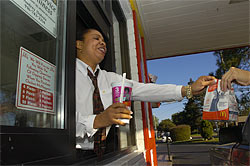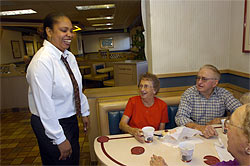
Sacramento Bee/Hector Amezcua |
Vielka McCollum, a
McDonald's manager in Elk Grove, visits with customers, from left,
Stella and Ernie Adam and Theda Baker. |
Flipping an imageMcDonald's battles the stigma that fast-food work is a dead-end job |
|
| By Rachel Osterman -- Bee Staff Writer | October 14, 2005 |
| Copyright © The Sacramento Bee | Story appeared in Business section, Page D1 |
| http://www.sacbee.com/content/business/careers/story/13712392p-14554880c.html | |
| Ask Vielka McCollum what she thinks about
working at McDonald's, and she'll tell you it's an archway of
opportunity.
"McDonald's is my career; I love it," said the Panamanian immigrant who rose from "crew" member earning minimum wage to her current job as manager of an Elk Grove McDonald's, taking home around $50,000 in salary and bonuses. She's the kind of dedicated employee McDonald's is trying to highlight in a new advertising campaign aimed at attaching a hip, contemporary image to an industry that has long been plagued by high turnover and low wages. Featuring Olympic track medalist Carl Lewis and recording artist Macy Gray, the "My First" ads now airing nationwide highlight successful people whose first jobs were at McDonald's.They've also put a spotlight on what it's like to labor in the fast-food industry, where jobs are often derided as burger-flipping "McJobs." Today McDonald's employs more than 1.6 million workers at more than 30,000 outlets worldwide, according to the company. It's not for everyone. Some former employees, like 18-year-old Samantha Heredia, complain of rude customers, teasing from friends and a harried, fast-paced workplace. The Sacramento teen said her summer job at a local McDonald's outlet was so dispiriting that she returned to high school determined to find other career options. "It motivated me. When my teachers would be like, 'You didn't turn your work in,' I would be like, 'Oh my God, I don't want to have to work at McDonald's.' " McDonald's television spots come at a time when the $20 billion company is responding to health-conscious critics by upgrading its menu with salad and fruit items and is refreshing its overall image with an uplifting "I'm Lovin' It" marketing campaign. The company's "My First" ads are unusual among fast-food chains, such as Wendy's and Jack in the Box, which tend to spotlight their food, not their people. The "My First" ads, which feature a global cast of former McDonald's employees from countries such as Japan, Germany and Australia, are "about expanding awareness of the opportunities McDonald's offers, with lifetime skills that serve people throughout their career, whether they are at McDonald's or somewhere else," said company spokeswoman Lisa Howard. As manufacturing jobs disappeared in the 1970s and '80s, McDonald's and other fast-food chains were criticized by some labor groups and social critics for not offering enough well-paying job opportunities in the country's growing service sector. They've also criticized the fast-food industry for lobbying against increases in the minimum wage. Many of those concerns still exist. "Jobs like those at McDonald's don't help the economy and don't help working families save for retirement and put their kids through college," said Jill Cashen, a spokeswoman for the United Food and Commercial Workers Union, which has tried to unionize fast-food workers. Precise numbers on the size of the fast-food work force are hard to come by. According to the U.S. Bureau of Labor Statistics, about 1.5 million people work as food preparation workers, a category that includes fast food. But the best-selling book "Fast Food Nation," published in 2001, estimates 3.5 million people work in the U.S. fast food industry, most of them under 20. The book, highly critical of the fast-food industry, said there's a turnover rate of about 300 percent to 400 percent a year. Marketing experts say fast-food jobs suffer from a perception of being uncool. "Whether you're working at McDonald's, Wendy's, Burger King, there's really no sex appeal to that kind of job," said Joseph Anthony, CEO of Vital Marketing, a Manhattan-based youth-marketing company. But the new ads, he said, "can make kids feel better about working at McDonald's. It's something to share with their friend: 'Hey, so-and-so worked at McDonald's, and look at him.'" Image aside, research has shown that workers can gain valuable skills from fast-food jobs. Anthropologist Katherine S. Newman spent several years following 200 workers at "Burger Barn" (her euphemism for an unnamed national fast-food chain) in Harlem, N.Y. In her book, "No Shame in My Game," she found that the employees took pride in holding a job, that managers encouraged them to study, and that the work provided much-needed structure in their lives. In a follow-up study - soon to be published - Newman interviewed the same workers eight years later and found about a quarter of them had moved on to stable, often unionized jobs that pay solid wages. About half were working in slightly more skilled positions in retail or hospitals, but hadn't significantly increased their earnings. And a quarter still struggled in entry-level jobs. "The 'Burger Barn' jobs didn't pay well, and everyone knew it," said Newman, now a professor at Princeton University. "Yet it's very valuable experience. There's no question that being in the labor market is better than not being in the labor market." It's a point emphasized by McDonald's officials, who say the chain teaches skills such as responsibility, discipline and teamwork applicable to any career. They point to people like McCollum, whose first job after immigrating here from Panama in 1996 was at a Sacramento-area McDonald's where she said she earned $4.25 an hour. Three years later, she was promoted to assistant manager with an $11-an-hour paycheck. "I was alone in this country, so my focus was McDonald's. I was at McDonald's all the time," she said. "People say I have ketchup in my blood." When promoted to store manager in 2001, "I was so happy I cried," said the mother of three, who's raising her kids in a three-bedroom home in Elk Grove. "If it wasn't for McDonald's, I wouldn't have everything I have."
FAST-FOOD WORKERS, U.S.Over the past three years, the number of workers employed in so-called "limited service eating places" has gradually increased, according to the U.S. Bureau of Labor Statistics. The numbers represent jobs in food preparation and serving.2002: 1.36 million
McDONALD'S WORK FORCE, WORLDWIDENo. of Employees: 1.6 millionNo. of Outlets: 30,000 (approx.) No. of people served: 50 million (daily) Source: U.S. Bureau of Labor Statistics, McDonald's |
|
